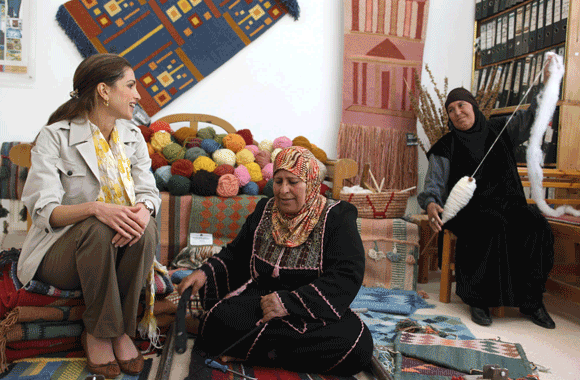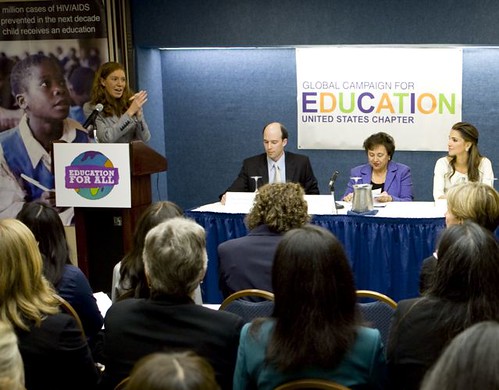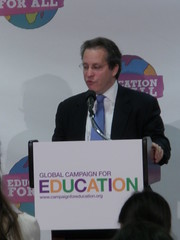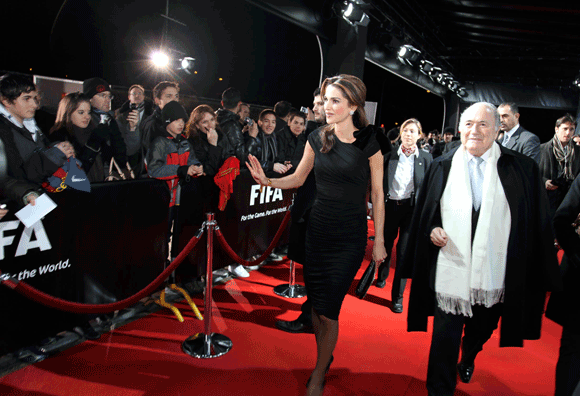A Celebration of Women™
is pleased to Celebrate the Life in this tribute to an Amazing Woman,
“As you educate a woman, you educate the family. If you educate the girls, you educate the future.” ~ Queen Rania
….a Tribute of Celebration to an Amazing Woman’s LIFE!
WOMAN of ACTION™
Queen Rania of Jordan

…launching
Global Education Campaign, April 2010
The Queen of Jordan was in Washington, DC to help launch “The Big Read” as part of Global Campaign for Education’s global action week calling for quality basic education for all children. “The Big Read” is a story book compiled of short stories about education written by such several education advocates including Queen Rania, Natalie Portman, Nelson Mandela, Mary Robinson, Alice Walker and Desmond Tutu.“This week, millions of children, teachers, adult learners, campaigners and parents around the world will call on global leaders to give every child, everywhere, a quality education,” said Queen Rania.
Rania Al Abdullah (Arabic: الملكة رانيا العبد الله Rānyā al-‘abdu l-Lāh; born Rania al Yassin on 31 August 1970) is the current Queen consort of Jordan as the wife of King Abdullah II of Jordan.As a global figure, and considered by some to be one of the world’s most powerful women, Queen Rania has focused her energy, at home and abroad, on a variety of causes, notably education.In Jordan, her work focuses on the calibre and quality of education for Jordanian children, while abroad she advocates for global education and for world leaders to fulfill their commitments towards the second Millennium Development Goal, universal primary education.
Personal life
Rania Al-Yassin was born in Kuwait to Palestinian refugee parents from Tulkarm.She attended primary school at New English School, and secondary school at the American School of Kuwait (A.S.K.) in Hawalli Kuwait, then earned a degree in Business Administration from the American University in Cairo. Upon her graduation from university, Queen Rania returned to Jordan and pursued a career in banking, working at Citibank, followed by a brief career in the field of Information Technology, at Apple Computer in Amman.
Marriage and children
She met Jordanian King Abdullah bin Al-Hussein, then Prince, at a dinner party in January 1993.Two months later, they announced their engagement and on 10 June 1993, they were married.They have four children:
- Crown Prince Hussein (born 28 June 1994)
- Princess Iman (born 27 September 1996)
- Princess Salma (born 26 September 2000)
- Prince Hashem (born 30 January 2005)
Becoming Queen of Jordan
Although her husband ascended on 7 February 1999, Rania did not become Queen immediately. She was proclaimed Queen of Jordan by her husband on 22 March 1999. Without proclamation, she would have been a princess consort, just like her mother-in-law, Princess Muna al-Hussein.Queen Rania speaking to Columbia University president Lee Bollingerat the 2008 World Economic Forum in Davos, SwitzerlandAreas of work
Since her marriage, Queen Rania has used her position to improve the livelihood of various sectors of society in Jordan and beyond.She is a global advocate for education and strong supporter of social development and economic opportunities for all.Queen Rania’s activities have encompassed issues such as community empowerment and sustainability, education, health, children, youth, women, and the environment, among others.
Education
Michelle Obama and Queen Rania of Jordan in theYellow Oval Room, White House 23 April 2009From Queen Rania’s numerous public appearances and speeches, she believes strongly that enhancing education is vital for bridging gaps, giving people hope, improving lives and ensuring stability throughout the world. To this effect, over the past few years, Queen Rania has launched, championed, and given patronage to a number of initiatives in education and learning.
- “Educating our children is not just about imposing a body of knowledge on them. Rather, it involves preparing children from the early years for the world in which they will come of age. It means instilling a love for lifelong learning, creativity, self-expression and an appreciation for diversity. “
In April 2008, Queen Rania launched “Madrasati” (“My School”), a public-private initiative aimed at refurbishing 500 of Jordan’s public schools over a five year period. One of her more major initiatives, Madrasati aims to improve education by creating a better learning environment, both physically and emotionally, engaging students, local businesses, and local communities to form committees and find collaborative means to improve the school.Phase II of Madrasati was launched at the end of April 2009, in which an additional 100 schools in Jerash, Ajloun, Balqa and Madaba are set to be renovated. The second phase builds on the establishment of a higher quality of education for children by continuing the significant progress made by Phase I of Madrasati.In October 2005, their Majesties King Abdullah and Queen Rania launched, in partnership with the Ministry of Education, an annual teachers’ award,known as the Queen Rania Award for Excellence in Education,aimed at setting national standards of excellence in teaching, and celebrating, encouraging and honoring those who achieve them. In 2009, the Award expanded to include school principals.Queen Rania established the Kingdom’s first interactive children’s museum to encourage and nurture lifelong learning for children and their families.The Children’s Museum of Jordan opened its doors to the public on May 23, 2007.It has more than 150 thought-provoking exhibits designed for children aged 14 and younger, a demographic that makes up almost 40 percent of Jordan’s population.Queen Rania is also Chairperson of the Royal Health Awareness Society (RHAS).Launched in September 2005,RHAS promotes health awareness among the wider public, focusing on comprehensive access to information, and helping to raise fit, strong, and socially-responsible citizens.One of RHAS’ initiatives includes the Healthy Schools Project which promotes wellbeing in schools by developing high standards for living, learning, and working.At the higher education level, and as part of Queen Rania’s support for education and development,the Queen Rania Scholarship Program was established in partnership with several leading universities from around the world. The scholarship program gives leading Jordanian students the opportunity to pursue top degrees ranging from management and marketing to design, business, finance, psychology, architecture, law, and many others, before returning home and contributing to Jordanian society.Community Empowerment
Queen Rania’s first venture was the establishment of the Jordan River Foundation (JRF) in 1995, a non-governmental organization, which has initiated socio-economic projects to enhance the livelihood of families and communities, through empowering women and developing their knowledge and skills in handicraft production and entrepreneurship.A statement on the website declares,
“Today, the Foundation is recognized nationally, regionally and internationally as an agent for positive change and as a leading Jordanian institution contributing to the social and economic well-being of citizens. Our activities have become models for emulation receiving accolades by our beneficiaries who are often held up as success stories”.JRF has two major programs: the Community Empowerment Program (CEP) and the Jordan River Children Program (JRCP).The CEP facilitates creative solutions to empower communities to participate in their own economic opportunities, making the most of the resources and skills they possess in order to ensure a safe, sustainable life. This includes income-generating projects such as Jordan River Designs, Wadi Al-Rayan, and Bani Hamida.These initiatives not only assist women in creating additional sources of income to support their families, but are also designed to empower women to become decision-makers within their family unit and to be skilled contributors to the Jordanian economy. Additionally, these projects have contributed to the revival of a heritage of craft production and tribal rug-weaving in Jordan. Over time, JRF has expanded its mission to include a more sustainable, holistic approach by investing more in communities than individuals, focusing on the needs of whole villages, and inspiring locals to take on the responsibility for working towards their own development.In 2007, JRF and an international corporation, partnered with a village in Ajloun, called Rasoun.The Jordan River Children Program (JRCP) was developed by Queen Rania to place children’s welfare above political agendas and cultural taboos. This led to the launch, in 1998, of JRF’s Child Safety Program, which addresses the immediate needs of children at risk from abuse and initiated a long-term campaign to increase public awareness about violence against children. “Dar Al-Aman”, the Child Safety Center, which is the first of its kind in the Arab region, became operational in August 2000, offering protection and rehabilitation to abused and neglected children, as well as counselling to their families.In 2005, JRF opened the Queen Rania Family and Child Center which promotes positive, practical training for parents, and provides facilities to encourage constructive and educational activities for children. The deaths of two children in Amman as a result of child abuse in early 2009 led Queen Rania to call for an emergency meeting of government and non-government (including JRF) stakeholders to discuss where the system was failing.In 2009, to celebrate the 10th anniversary of her husband, King Abdullah’s accession to the throne, Queen Rania launched a community champion award (Ahel Al Himmeh) in March to highlight the accomplishments of groups and individuals who have helped their local communities. 45,000 nominations from across the Kingdom were received, and on the June 28, 2009 the winners were announced in a celebration conducted in the Roman Amphitheatre in downtown Amman.Queen Rania believes that an essential aspect of education is to equip youth with the necessary skills that enable them to perform well in the workplace. She is a strong supporter of INJAZ (Junior Achievement World Wide), which was established by Save the Children in 1999 and launched as a Jordanian non-profit organization by Rania in 2001. INJAZ aims to build the skills of Jordan’s future work force and enhance competitive adaptability in the global marketplace. In her capacity as the Regional Ambassador of INJAZ Arabia, Queen Rania has taught classes, joined youth around the world in frank dialogue sessions, and launched INJAZ’s presence elsewhere in the Arab world.At the 2008 World Economic Forum in Davos, she launched the
“Empowering One Million Arab Youth by 2018″ campaign,
which was conceived by INJAZ Arabia.
Ensuring educational and job opportunities for youth is also why Queen Rania initiated the Al Aman Fund for the Future of Orphans in 2003. She has also partnered with a various number of international universities providing scholarships for Jordanian students to study abroad.Global Agenda
“No matter where we come from… what we look like… how we dress… or to whom we pray… when it comes to what makes us laugh or cry… when it comes to what we dream of for ourselves and for our children… when it comes to how hard we work each day… we are usually more alike than we are different.”
Global Education
In November 2000, in recognition of her commitment to the cause of children and youth, the United Nations Children’s Fund (UNICEF) invited Queen Rania to join its Global Leadership Initiative. The Queen works alongside other world leaders, including former South African President Nelson Mandela, in a global movement seeking to improve the welfare of children. In January 2007, Queen Rania was named UNICEF’s first Eminent Advocate for Children. In August 2009, Queen Rania became Honorary Global Chair of the United Nations Girls’ Education Initiative (UNGEI). As a long time supporter of the Global Campaign for Education (GCE), Queen Rania met with children and inspirational women in South Africa, both in the cities of Johannesburg and Soweto, in March 2009.Queen Rania and the women took turns reading a short story out of The Big Read to the children, in an effort to encourage literacy.One of the stories in the book, “Maha of the Mountains”, was contributed by Queen Rania. In Soweto, she was the first to write her name in the back of the Big Read, before passing it on to everyone else to write their name.During her April 2009 US trip, Queen Rania joined leading education advocates Congresswoman Nita Lowey andCounsellor to the Secretary of the Treasury Gene Sperling to launch “The Big Read” as part of Global Campaign for Education’s global action week calling for quality basic education for all children. She was also hosted by first lady, Michelle Obama, during that same trip. On August 20, 2009, Queen Rania co-founded and led the launch of the “1GOAL: Education for All” campaign alongside Gary Lineker, and with the help of top international footballers at Wembley Stadium, London, Britain. Queen Rania is co-founder and global co-chair of the 1GOAL campaign to rally World Cup 2010 fans together during the world’s biggest single sporting event and call on world leaders to give 75 million children out of school an education.On October 6, 2009, Queen Rania was joined by Gordon Brown of the UK, the President of FIFA, Sepp Blatter, President Jacob Zuma of South Africa, and other heads of state, for the Global Launch of 1GOAL, which took place across six locations worldwide. Queen Rania spoke of the need to turn this “tragedy into triumph” and called on political leaders to stand by their aid commitments. In 2008, Queen Rania participated in YouTube’s In My Name campaign. She appeared alongside Black Eyed Peas member will.i.am in the video, “End Poverty – Be the Generation,” which urged world leaders to keep the promises they made in 2000 at the United Nations Millennium Summit.2011 and beyond …
In an unprecedented move the leaders of Jordan’s main Bedouin tribes have published an open letter addressed to King Abdullah II accusing his wife, Queen Rania, of corruption. The text, released on 5 February, is signed by 36 representatives of the main Bedouin tribes. It comes at a particularly difficult time for the king, whose authority has been sapped by the growing discontent voiced by demonstrators.On 9 February the recently appointed prime minister, Marouf Bakhit, announced a new cabinet including several leftwing figures and an Islamist. But this timid opening seems unlikely to end the unrest.Until now the monarchy had managed to play on the opposition’s instinctive loyalty. “It is not the king who is to blame,” Hamza Mansour, the secretary-general of the Islamic Action Front (the political arm of the Muslim Brotherhood), recently told Le Monde, “but the clique surrounding him.” The outlook seems even more uncertain now that the tribes have added their voice to the tide of criticism.The letter makes no direct reference to the issue of the country’s fragile ethnic balance, but claims that the queen, of Palestinian parentage, has created centres of power serving her own interests. This trend upsets the agreement on governance between native Jordanians and the royal family, posing a threat for the monarchy.“We call on the king to return to the treasury land and farms given to the [queen’s] Yasin family. The land belongs to the Jordanian people,” the letter demands.
The king’s council made a counterattack, with the Howeitat tribal confederation publishing several communiqués in support of Abdullah.The queen often appears on the covers of gossip magazines the world over, with endless comment on her glittering lifestyle, in particular her lavish 40th birthday last August in the Wadi Rum desert.Jordan “will sooner or later face the flood of Tunisia and Egypt due to the suppression of freedoms and looting of public funds,” the letter warns.It endorses several of the demands expressed by the Islamist opposition.• This footnote was added on 22 February 2011. Following news agency
reports in early February of local allegations of corruption involving some
members of Jordan’s ruling family (reports then reflected in subsequent
media articles, including the one above) the family’s office in Amman
published a strong denial, stating that such reporting “contains serious
allegations … in which there is no truth whatsoever.”The full statement can be read here: http://bit.ly/jordanreply.Accusations always fly in times of change and/or turbulence.If these allogations are False, as we hope, may Her Majesty, Queen Rania Take Action!
2012
For the second consecutive year, Queen Rania Center for Entrepreneurship (QRCE) partners with ArabNet to boost its Digital Summit 2012, slated to take place in Beirut between 27-31 March. The premier regional gathering for the emerging Arab web and mobile industry seeks to raise Arab awareness of the latest regional and international innovations in this technology sector.For his part, Farhan Kalaldeh, QRCE’s Executive Director, said, “Our support for the ArabNet summit stems from our belief in the important role it plays in acquainting Arab youths with the proper ways of deploying and utilizing modern technologies and in creating job opportunities.”
DETAILS HERE
 VISIT: WWW.QUEENRANIA.JOFACEBOOK: http://www.facebook.com/QueenRaniaTWITTER: twitter.com/tituswille/queen-rania-
VISIT: WWW.QUEENRANIA.JOFACEBOOK: http://www.facebook.com/QueenRaniaTWITTER: twitter.com/tituswille/queen-rania-Copyright 2022 @ A Celebration of Women™ The World Hub for Women Leaders That Care
Queen Rania supports Education for All Children! – WOMAN of ACTION™
March 4, 2012 by

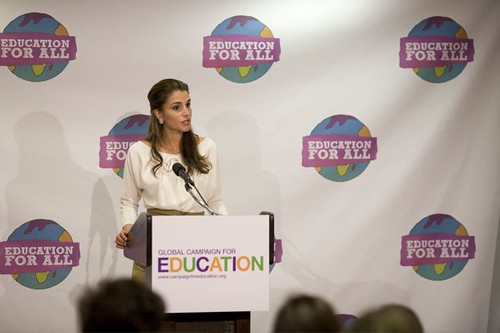
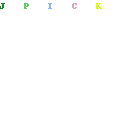






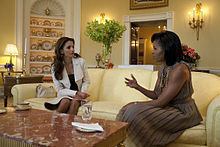

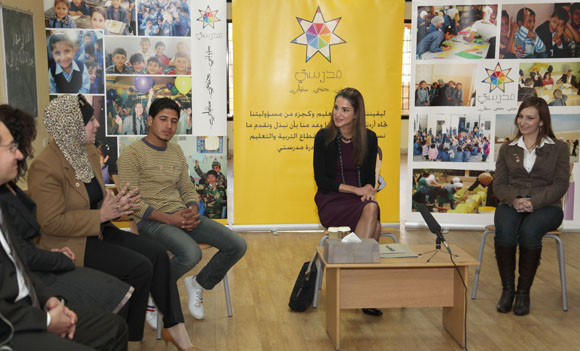


.jpg)







